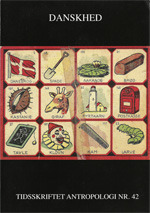JANTELOVEN – MODVILJEN MOD FORSKELLIGHED: Danske forestillinger om lighed som enshed
DOI:
https://doi.org/10.7146/ta.v0i42.107446Resumé
theory have stressed the concern for establishing a coeval relationship between observations, normative assumptions and their propositions; domains of enquiry not only overlap but are implicated in each other. It has been further argued that anthropology does not just deal with cultural differences, other cultures or social systems, but how such differences are embedded in hierarchical relationships of power. This ethnographic account explores "Janteloven" as doxic knowledge: a taken-for-granted, realised morality, sittlichkeit, reflected within the cosmological and political order (the welfare state) of Danish society. It is not perceived as arbitrary or, as one possible order among many others, but as inculcated knowledge so as to appear as a natural order. Thus it goes without saying and which there-fore, also goes unquestioned, for example, with reference to globalisation and immigrants. This gender sensitive ethno-graphic account drawn from field-work in and around Copenhagen from September 1999 to May 2000. It is based upon conversations (not structured interviews) exploring habitus (and the symbolic forms of cultural capital) with Danish and Nor-wegians belonging to various classes and age groups within society. This piece of ethno-graphy draws upon Fabian’s performance theory and discusses how ideas about "danskhed" (Danishness) in "Janteloven" occupy wider institutional and discursive spaces in which theories and practices particulary in relation to the Self and the "Other" are inscribed.
Downloads
Publiceret
Citation/Eksport
Nummer
Sektion
Licens
Ophavsretten til artiklerne i Tidsskriftet Antropologi tilfalder forfatteren.
Artikler publiceret i Tidsskriftet Antropologi må citeres, downloades og videresendes for ikke-kommerciel brug, under forudsætning af normal akademisk reference til forfatter(e) samt tidsskrift, årgang, nummer og sider. Artiklerne må kun genudgives med eksplicit tilladelse fra forfatter(e) og tidsskriftet.


